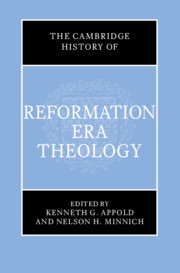Book contents
- The Cambridge History of Reformation-Era Theology
- The Cambridge History of Reformation-Era Theology
- Copyright page
- Contents
- Figures
- Acknowledgments
- Contributors
- Abbreviations
- Introduction
- Part One Theology in an Age of Cultural Transformation
- 1 The Printing Press and its Impact on the Production, Proliferation, and Readership of Theological Literature
- 2 Humanism and Theology
- 3 The Changing Role of the Bible in Theological Discourse
- 4 The Regulation of Theology in the Reformation Era
- 5 Political Change and Theological Discourse
- 6 Universities, Monastic Studia, Academies, Seminaries, and Catechesis
- 7 Para-Academic Theology: Theology of the “Uneducated”
- 8 Gender and Theology in the Reformation Era
- 9 The Theologians and the Clergy: Who Were They?
- Part Two Schools and Emerging Cultures of Theology: Diversity and Conformity within Confessions
- Part Three Topics and Disciplines of Theology
- Index
- References
1 - The Printing Press and its Impact on the Production, Proliferation, and Readership of Theological Literature
from Part One - Theology in an Age of Cultural Transformation
Published online by Cambridge University Press: 27 September 2023
- The Cambridge History of Reformation-Era Theology
- The Cambridge History of Reformation-Era Theology
- Copyright page
- Contents
- Figures
- Acknowledgments
- Contributors
- Abbreviations
- Introduction
- Part One Theology in an Age of Cultural Transformation
- 1 The Printing Press and its Impact on the Production, Proliferation, and Readership of Theological Literature
- 2 Humanism and Theology
- 3 The Changing Role of the Bible in Theological Discourse
- 4 The Regulation of Theology in the Reformation Era
- 5 Political Change and Theological Discourse
- 6 Universities, Monastic Studia, Academies, Seminaries, and Catechesis
- 7 Para-Academic Theology: Theology of the “Uneducated”
- 8 Gender and Theology in the Reformation Era
- 9 The Theologians and the Clergy: Who Were They?
- Part Two Schools and Emerging Cultures of Theology: Diversity and Conformity within Confessions
- Part Three Topics and Disciplines of Theology
- Index
- References
Summary
In 1521 Martin Luther spent a tense and frustrating year in the Wartburg Castle. Five years previously he had been virtually unknown outside the narrow circle of his colleagues in the German Congregation of the Augustinian Hermits order. Now he was one of the most notorious men in Germany, a condemned heretic and a German cause célèbre. His incarceration in the Wartburg came immediately after his appearance at the German Imperial Diet, an interview forced on a reluctant emperor by the German princes. Now he was a fugitive, an outlaw, living under the protection of his own ruler, the elector of Saxony, who had his own reasons not to surrender Luther for punishment for his heresies.
- Type
- Chapter
- Information
- The Cambridge History of Reformation Era Theology , pp. 9 - 20Publisher: Cambridge University PressPrint publication year: 2023



